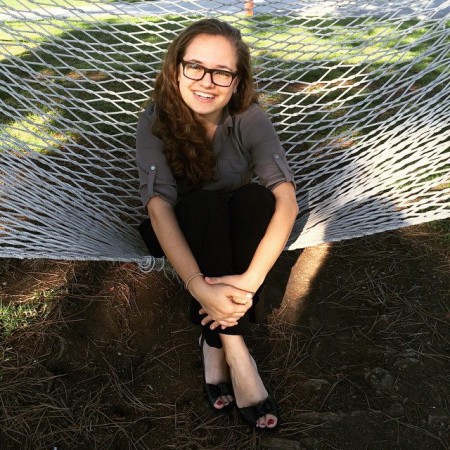Here in the Office of Admission, we tend to focus on prospective students – helping them learn about our institution and generally attempting to make the college application process less scary than it seems. We get to work with current students as they help guide tours, coordinate overnight stays, and interview prospective students in the office. But once in a while we should take a moment to connect with our wide network of Pitzer alumni, who have entered the world with their toolbox of globally-minded thoughts and engaging, defining experiences attained during their time at Pitzer.
I reached out to Pitzer Class of 2010 graduate Tim Campos for an opportunity to share his Pitzer and post-Pitzer success story. He was incredibly generous to sit down with me for a lunch in the Village and discuss how Pitzer has shaped him.
I asked him many questions and made it difficult for him to eat his lunch (sorry about that, Tim), but as the conversation went on I became more and more impressed with his connection to Pitzer’s core values, and how he has been able to positively impact the community that helped him grow. Below I have summarized and transcribed bits of our conversation that you may find enjoyable or enlightening. Happy reading!
First, here are the basics about Tim:
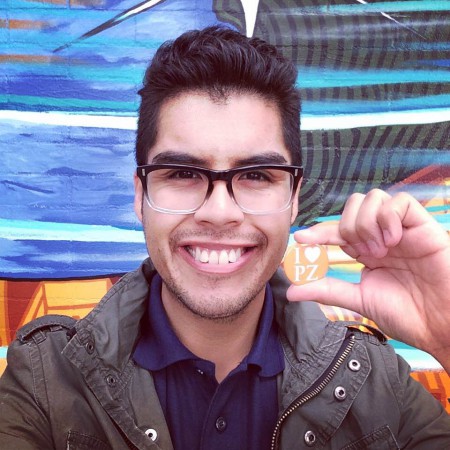
Year of Graduation: 2010
Major(s): Sociology and Chicano/a-Latino/a Studies
Minor: Studio Art
Hometown: Claremont, CA
Pitzer Activities: (honestly too many to list, but…) President of the Latino/a Student Union (LSU), Mentor within Chicano/a Latino/a Student Affairs (CLSA), Community Coordinator for on- and off-campus activities, one of the founders of the annual Rockabilly Festival, member of the Student Senate Diversity Committee, member of the Senior Gift Committee, and an admission junior staff extraordinaire (aka a tour guide, diversity intern, and admission fellow)
Current Job: Marketing Coordinator at HartmanBaldwin Design/Build, a fully integrated architecture, construction, and interior design firm
Our conversation revolved around both his participation in the Pitzer community as a student, as well as how he has remained connected as an alumni.
Katie: How did you decide on Sociology and Chicano/a – Latino/a Studies as your majors?
Tim: I had originally planned to pursue the premed track. Upon arriving at Pitzer I was convinced that pursing a premed track and eventually becoming a doctor was what I wanted. But I quickly realized that my passion was not in science, let alone medicine, but helping my community. Taking my first introductory sociology course at Pitzer was the pivotal moment that persuaded me to pursue a major in the social sciences. Sociology courses taught by Professor José Calderón and Professor Phil Zuckerman were certainly some of the best. As for Chicano/Latino Studies, I knew coming into Pitzer that Ethnic Studies would somehow find its way into my course curriculum.
K: So tell me more about starting the Rockabilly Festival at Pitzer. (Note to the readers: The Rockabilly Festival remains one of the largest annual cultural events at Pitzer, drawing over a thousand attendees, both Claremont College students and community members. To find out more about this festival, watch the video below.)
T: The concept for the Rockabilly Festival really originated with Professor Adrian Pantoja. Professor Pantoja and the Latina/o Student Union had already been collaborating on a few campus events and he was our advisor at the time. With his passion for car culture and specifically how it intersects with Latino/a culture here in the greater Los Angeles area, members of LSU were quick to collaborate and the rest was history. The festival incorporated a car exhibition, as well as an art show and concert featuring rockabilly bands from all over Southern California. While the College already had musical festivals like the popular Kohoutek music festival, we wanted a festival that was open and inclusive, while speaking to the Latino/a community at Pitzer, the Claremont Colleges, and beyond. Today, the Rockabilly Festival is certainly known throughout the Claremont College and Inland Empire communities. This year the group (LSU) will be celebrating the festival’s eighth year. All of the organizing efforts and behind-the-scenes work over years of planning the festival actually provided the foundation to my senior thesis, which focused on the intersection of Latino and rockabilly cultures.
“We wanted a festival that was open and inclusive, while speaking to the Latino/a community at Pitzer, the Claremont Colleges, and beyond.”
K: That’s great. It sounds like a very interesting thesis! And since then, what has been your career path after Pitzer?
T: As an Admission Fellow in my senior year at Pitzer, I realized that higher education was an avenue I wanted to explore professionally. I recall having the opportunity to travel to Portland, Oregon and conduct interviews with prospective students over winter break of that same year. That particular experience solidified my decision to pursue higher education at the administrative level. So in the spring, I applied to several admission counselor openings and one just happened to open up at Pitzer. Two weeks after graduating, I began my career exploration as an admission counselor at Pitzer, recruiting students, reading applications and representing the College while helping cultivate diversity initiatives on campus through my work with the Preview Pitzer Program. Aside from that, I also managed social media and assisted with communications and marketing initiatives. I realized though that I was missing a more creative environment as an artist, so I switched careers and became a marketing coordinator for HartmanBaldwin Design/Build, which is a fully integrated architecture, construction, and interior design firm in Claremont and Pasadena. As marketing coordinator, I am responsible for the coordination of key marketing projects including advertising, community relations, online marketing, copywriting, and execution of other relevant initiatives. Currently, I am pursuing a Master of Communication Management (M.C.M.) at USC Annenberg School for Communication and Journalism. And who knows, upon completion of the program I may find myself back in the world of higher education, but most certainly in a career combining leadership, communication, and marketing.
K: So how would you say Pitzer prepared you for life after college?
T: Pitzer prepared me both professionally and personally. There were a handful of influential Latino mentors that I credit for nurturing my leadership and personal growth while at Pitzer. My advisor and professor, José Calderón, instilled in me a sense of taking what I had learned in the classroom and applying theory to practice in creating change in my local community. Professor Calderón would always say, “Remember brother, don’t let your studies interfere with your education.” Former VP and Dean of Admission, Angel Perez, has probably been one of the most influential figures in my life thus far, both as an undergraduate student and professionally. Being a first generation Latino male, it was awe-inspiring to have mentors like José Calderón and Angel Perez because knowing there were similarities in our experiences made my time at Pitzer much more rewarding.
“There were a handful of influential Latino mentors that I credit for nurturing my leadership and personal growth while at Pitzer.“
K: Would you advise anybody going to college (or going to Pitzer) to study abroad?
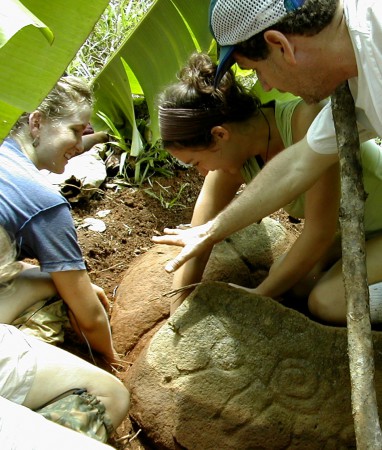 Studying abroad is an incredibly important component to many Pitzer students’ educational journeys. Photo courtesy of Pitzer College.
Studying abroad is an incredibly important component to many Pitzer students’ educational journeys. Photo courtesy of Pitzer College.
T: Studying abroad during the summer of my junior year at Pitzer was another pivotal moment for me personally. While in Costa Rica, I was able to step out of my comfort zone and gain a greater intercultural understanding from what I was so accustomed, as someone born and raised in Southern California. So yes, to answer your original question, I think students looking to go to Pitzer should be open to going abroad. Study abroad should be on the top of their list… While other universities offer traditional study abroad programs, our programs incorporate the [core] values so well into the curriculum, while focusing on global/local initiatives. Upon returning, our programs encourage students to question how they can apply the experience to their local community, while examining the cross-cultural connections.
“While in Costa Rica, I was able to step out of my comfort zone and gain a greater intercultural understanding from what I was so accustomed, as someone born and raised in Southern California. “
K: Definitely. So this is a little different since you worked at Pitzer for three years after graduating, but since then, what are some ways you have stayed connected with Pitzer since graduating?
T: Even if I hadn’t worked at Pitzer post-graduation, I would have still stayed connected to the College. Since I was heavily involved in various leadership roles as a student, it would have been difficult not to come back and be involved in some aspect. I have stayed connected to Pitzer through my leadership on the Alumni Board. As one of the governing bodies on the board, I work collectively with fellow board members to enhance areas such as Alumni Reunion Weekend, the Alumni Volunteer Network, Young Alumni programming, and more recently the Annual Fund. As an Alumni Board, we create programming and networking opportunities; enhance the educational, cultural, social and professional lives of recent graduates, while maintaining a connection between alumni and the College. And aside from my responsibilities on the board, I look for opportunities to come back to campus and share my experiences with current students or prospective students for that matter when my schedule permits.
“Since I was heavily involved in various leadership roles as a student, it would have been difficult not to come back and be involved in some aspect.“
K: And what are some things you do on the Alumni Board specifically?
T: My involvement on the Board has evolved over the years…when I first started on the Board I really focused on young alumni engagement. And now I’ve transitioned into working more on the development pillar, more specifically the Annual Fund and increasing alumni participation. In my role, I am essentially reconnecting with alumni, and re-engaging them with the Pitzer community, while informing them of new campus initiatives.
K: With your experience and how you’ve seen Pitzer change since you’ve graduated, do you see it growing more in a certain way in the next 5 or 10 years?
T: Pitzer has definitely made a name for itself in the last decade and with the recent 50 Forward Campaign, we hit a milestone. I think for us here at the College it’s nice to be in a position where we can no longer say, “well, we’re young”. No, we are 50, proud, and we are moving our community forward. Pitzer has become one of the leading liberal arts institutions in America. In my mind, Pitzer College is an innovative and creative think tank. We are producing more and more socially conscious agents of change who are prepared with the resources and passion to leave Pitzer and transform the world. I think in the next ten years I’d like to see Pitzer really push that number of 75% of students that go abroad to be in the 90s, or maybe 100%. But I really want Pitzer in the next 10 years to be the leading institution, so that when someone thinks, “we are looking for an institution that’s going to be innovative and pushes us out of our comfort zone”, the institution that people think of is Pitzer.
“We are producing more and more socially conscious agents of change who are prepared with the resources and passion to leave Pitzer and transform the world. “
K: I agree; that would be a great position to be in! And I think it’s on its way. So thinking back to your time as a student, and now your time as an alumnus, what kind of advice would you give to either current or prospective Pitzer students?
T: For prospective students first – it doesn’t matter where you end up, college-wise. What matters is what college is going to make you grow, and meet your needs. You’re going to be at a place for four years; you want to make sure you’re going to be happy for four years. Ask yourself, “Am I going to grow?” All the other aspects are great and worth considering, but at the end of the day are you going to grow and be happy with your decision? For current students – take advantage of all the opportunities that Pitzer offers. Step out of your comfort zone. Don’t be afraid to rattle the cage a bit. That’s what Pitzer was founded on…students eager to engage and question everything. I think that’s ok; it’s healthy. It indicates that students are not only interested but they are also aware of what’s going on around their community. Don’t be afraid to utilize the resources of the Claremont Colleges. We are part of a consortium for a reason.
“It doesn’t matter where you end up, college-wise. What matters is what college is going to make you grow, and meet your needs. You’re going to be at a place for four years, you want to make sure you’re going to be happy for four years.”
K: What kind of things did you partake in on the 5C scale? (Note to the readers: 5C is jargon for taking place at all five undergraduate Claremont Colleges.)
T: Well, being a Chicano/a – Latino/a studies major, which is 5-college, I was able to take courses across all of the various Claremont Colleges. Aside from academics, I was highly involved within the Claremont College community. As previously mentioned, I was a Chicano/Latino Student Affairs mentor for first-year students. Additionally, I was part of the Cesar Chavez Celebration Committee and helped organize programming throughout that month of celebration. I was part of the 5-college Latino graduation committee and a 5-college Latina/o Leaders Coalition. But back to academic resources, I really took advantage of the arts at Scripps, [specifically] the digital art program, which spawned an interest in digital art and design.
K: So how would you say Pitzer’s five core values have stuck with you after college in what you do and how you live your life?
T: Pitzer has allowed me to question my own practices and pay more attention to my carbon footprint. From the type of car I drive… to knowing where my food comes from and eating local…it was great to be a part of a place that encouraged sustainable practices. Pitzer values are not forced. You come to Pitzer because in your college search process you looked for an institution that provide similar values or would push you to challenge your own values and beliefs through positive dialogue. Aside from sustainability, I can say with confidence that all of the core values have stuck with me post-Pitzer. I always aligned with the core values, but Pitzer only amplified those values with a stronger foundation and sense of pride.
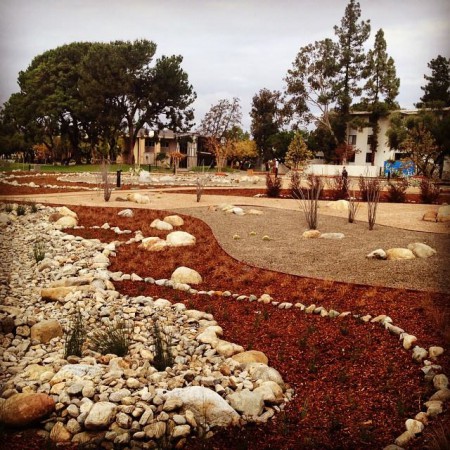 Pitzer continues to improve the campus’s carbon footprint with additions like the new Holden Garden.
Pitzer continues to improve the campus’s carbon footprint with additions like the new Holden Garden.
“Pitzer has allowed me to question my own practices and pay more attention to my carbon footprint. From the type of car I drive… to knowing where my food comes from and eating local…it was great to be a part of a place that encouraged sustainable practices. “
K: Are there other parts of your life that connect you with Social Responsibility?
T: Yes, for example, connecting with a non-profit in Los Angles called HOLA (Heart of Los Angeles), where I assisted in the college application process through facilitation of mock application review and personal statement writing workshops. I am always eager to assist first-generation college-bound students through the college application process. As a first-generation Latino college student myself, I understand the importance of having access to resources and mentors. Speaking of mentors, I plan to establish a mentorship program at Pitzer that would pair current Latina/o students with Latina/o alumni.
K: Is there something that is your favorite thing about Pitzer?
T: That’s such a hard question… As an artist I love the art policy on campus, and the murals, along with the native drought-tolerant landscape and rich architectural history. But in all seriousness, the core of my Pitzer experience is rooted in shared experiences with fellow classmates and the extraordinary teachings and mentorship of Latina/o faculty members like professors Jose Calderon, Adrian Pantoja, and Maria Soldatenko. These same faculty members (and countless others) truly care about the students.
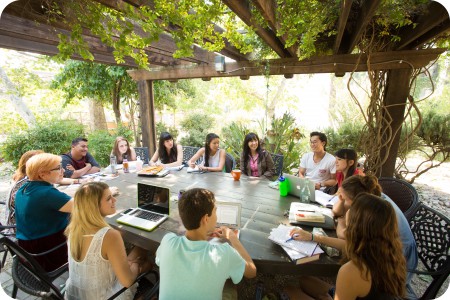 A class with Professor Roberta Espinoza held in the outdoor classroom. Photo courtesy of Pitzer College.
A class with Professor Roberta Espinoza held in the outdoor classroom. Photo courtesy of Pitzer College.
“The core of my Pitzer experience is rooted in shared experiences with fellow classmates and the extraordinary teachings and mentorship of Latina/o faculty members.”
K: I think we’ve talked about this throughout the lunch, but what are some of the big takeaways from your Pitzer education, either academic or social?
T: Academically, I feel Pitzer really prepared me for a writing intensive and rigorous graduate program. I’m at a graduate program that has a lot of writing, and I did a lot of writing at Pitzer…so many research and reaction papers – 15 or 20 page papers. The First-Year Seminar, and the writing intensity of it, to my senior thesis, really prepared me for my graduate coursework. I mentioned this already, but being in the Pitzer community really pushed me to step out of my comfort zone and also see my potential as a leader. Pitzer faculty and staff encouraged and fostered my leadership throughout my years.
K: And this probably is a tough question to answer too, but looking back at your four years there, were there certain memories that you really appreciate or enjoy, or things that you are thankful for?
T: Yeah, definitely. I was just at Family Weekend a few days ago, and I was able to sit down with some alumni after the alumni panel that I moderated. We were there in the dining hall, and I just felt like I was back for a Saturday morning meal having brunch with friends. It’s the little things like that I do miss. Just connecting with friends, with fellow Pitzer students on campus, over a meal. We form such a close-knit community on campus that you become part of a family… whether it’s a classroom experience or social experience, just to be able to have that sit-down time and communicate and share with friends and fellow classmates, that’s something you don’t get every day and something I do miss.
Stay tuned for more alumni spotlights ~ next up is Mitchell Felton, Class of 2013!
Posted by Katie Shepherd, Admission Counselor
